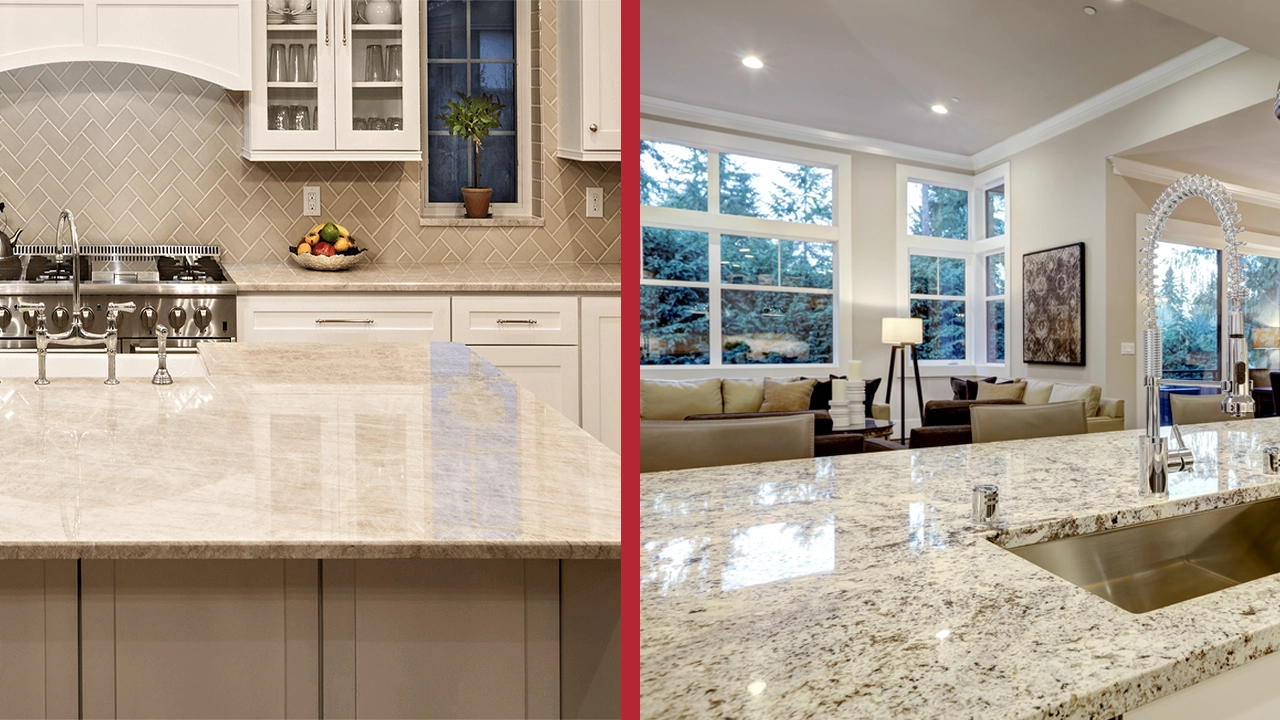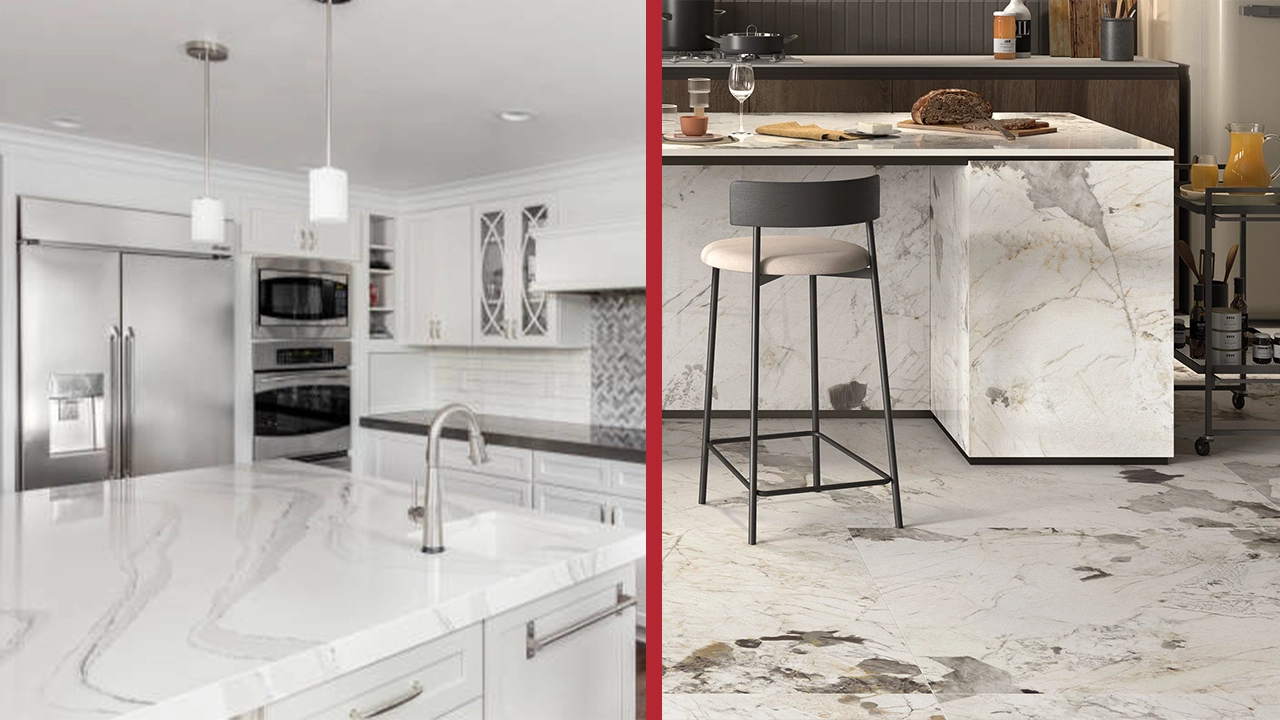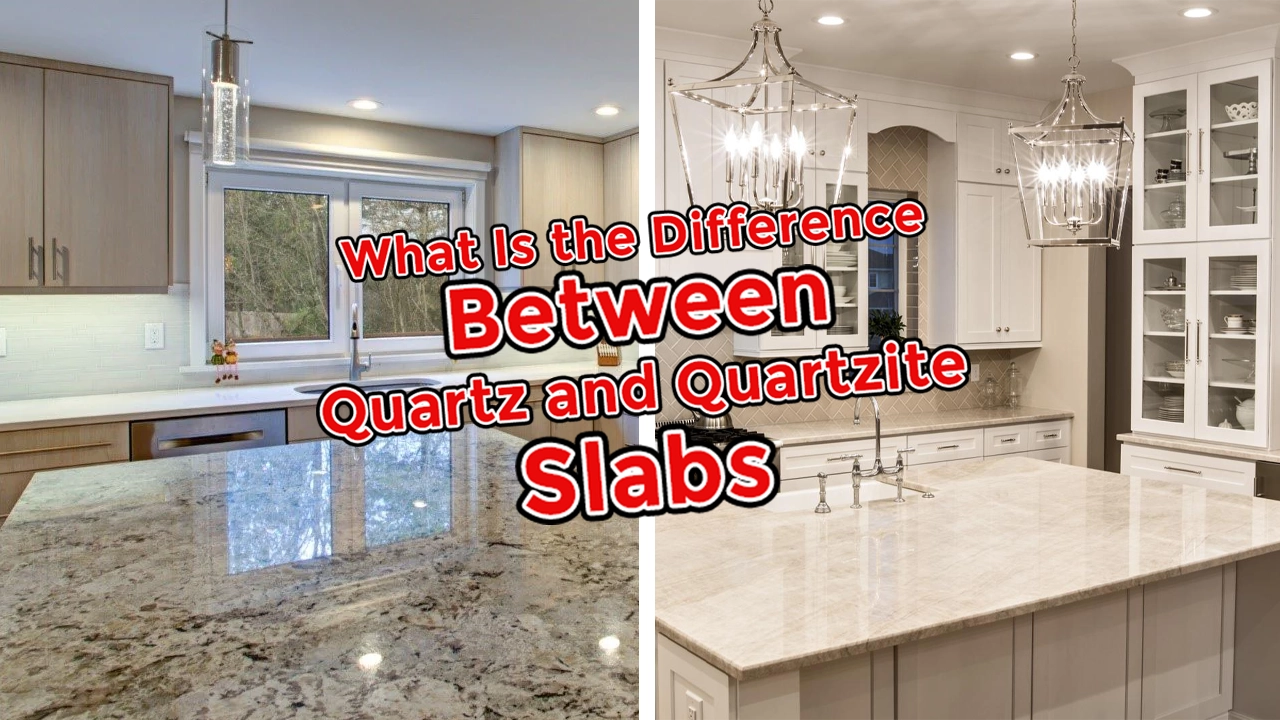Quartz and quartzite are among the most used materials in home design. The question arising here is, what is the difference between quartz and quartzite? It is a common question. Both of these materials look similar, but they are not. Quartz and quartzite countertops are different.
The other question is whether quartz and quartzite are the same thing. The answer is no. This article will be very helpful if you want to compare quartz and quartzite. In addition, we will help you understand the difference between quartz and quartzite stone and recognise the difference between them.
To start, we must know what each material is.
What Is Quartz
Quartz is not a natural stone in every way. It is a man-made product. It is made in factories. At times, people mix crushed quartz with resin and add a colour. After that, they will make the mix into slabs.
Quartz is smooth and polished. This may take the form of another stone. For example, some quartz looks like marble. Some looks like granite. That is why many people often ask, What’s the difference between quartz and granite countertops?
Quartz is non-porous, and the water cannot go in. It does not need sealing. It’s an easy one to clean and take care of. Just use soap and water. Busy kitchens and bathrooms consider it great.
Also, however, quartz does not like heat. Do not put it on hot pans. It might get damaged.
What Is Quartzite
Quartzite is a natural stone. It comes from sandstone. Sandstone is eventually turned into quartzite by heat and pressure over time. The exact location is deep down in the earth. Thus, quartzite is a real stone rather than a fake stone that is removed from quarries.
Quartzite is harder than quartz. It is very strong. It can handle high heat. You can put hot pans on it. This will not be easily damaged.
Do people ask if quartzite and quartz refer to the same thing? No. Natural quartzite and man-made quartz are quite different.
Quartzite also looks more natural. It has an unusual look and hues. No two pieces look the same. Due to this reason, people who seek a natural and timeless appearance use quartzite.
But quartzite needs sealing. It is porous. If it isn’t sealed, then the water can go inside. One should seal it once or twice a year.
Quartz vs Quartzite Comparison Table
| Feature | Quartz | Quartzite |
| Made From | Man-made with crushed quartz & resin | Natural stone formed from sandstone |
| Looks Like | Smooth and even design | Natural with unique lines and colors |
| Heat Resistance | Low – can get damaged by hot pans | High – safe for hot pans |
| Maintenance | Very easy – no sealing needed | Needs sealing once or twice a year |
| Cost | Less expensive | More expensive |
| Strength | Strong but less than quartzite | Very strong and durable |
| Porous or Not | Non-porous | Porous – needs sealing |
| Custom Colors | Many color choices | Mostly soft natural tones |
| Best For | Easy-care kitchens and bathrooms | Natural style and high-heat areas |
Detailed Comparison is below.
Difference in Quartz and Quartzite

When you look at how they are made, quartz and quartzite are entirely different. Quartz is made by mixing real quartz pieces with resin; on the other hand, quartzite is created by nature.
The difference in how the two feel at the counter is another difference. Quartz feels smooth and even. Quartzite has a natural, texturised surface.
Therefore, if you have doubts about your quartz and quartzite, look at the patterns. Quartz has a very uniform look. Due to their random appearance, Quartzite is less fashionable than granite.
Appearance
Quartz and quartzite in their appearance are based on the choice.
Quartz comes in many colors. White, black, grey, even red or blue are just some of the possibilities. It can duplicate the appearance of other stones. It has a clean, even design.
Quartzite looks more natural. The soft colours available in it are white, cream and light grey. There are rare green, blue, or pink quartzite. Each slab of quartzite has unique patterns.. This works perfectly if you have that natural look in mind.
Durability
However, when comparing quartz to quartzite, both are strong. But quartzite is stronger.
Quartz is durable. It does not scratch easily. But it is not heatproof. Pans should be handled carefully with hot pans.
Quartzite is harder than quartz. It is heat-resistant. It can be also used near the stoves, the fireplaces, etc. For this reason, quartzite is the material most people choose for their outdoor kitchens or other places where heat is in use.
Maintenance
Another difference between them is which one needs more attention and care.
Quartz is non-porous. It does not need sealing. It is easy to clean. Squeeze out with water and a cloth with soap.
Quartzite is porous. It needs sealing once or twice a year. So it remains safe from the water and stains.
If you want something with low maintenance, quartz is the better choice.
Cost
The question that people ask most often is, what is the price difference between quartz and quartzite?
Quartz is usually less expensive. There are many price options. Cheap and high-end quartz slabs are also available to look for.
Quartzite is more expensive. It is harder to find and cut, and it is also more expensive to install. However, it is a long-lasting material.
Lifespan
Quartz and quartzite also last a long time. With proper care, they can stay lovely for numerous years.
Quartz can last 10 to 30 years. Quartzite can last even longer. It is very strong and tough.
Thus, if you opt for a countertop that will last years, both are good. Quartzite, however, may outlast much longer.
Trendy vs Timeless
Some prefer a trendy style, while others like a timeless look. Therefore, let us continue to compare quartz and quartzite.
Quartz is trendy. It comes in modern designs. It can be made to match the latest residential style.
Quartzite is timeless. It looks natural and elegant. It never goes out of style.
Hence, to have a new modern look, go for quartz. If you are sure that you want something that will always look classical, quartzite is one of the options.
Which Is Better: Quartz or Quartzite?

Thus, the simple question now arises: What is the difference between quartz and quartzite, and quartzite or quartz?
Both are great. However, the choice is made dependent on what you need.
- Pick quartz if you want a smooth, colorful, and low-maintenance option.
- Pick quartzite if you want a natural, heat-resistant, and long-lasting stone.
Also, think about your budget. Its higher cost means that quartzite also provides you with a unique natural look.
But if you are still confused about whether there is any difference between quartz and quartzite, then here is the answer: yes, and you already know the difference.
Conclusion
Both quartz and quartzite are excellent options for countertops. It is best if you want something easy to clean and budget-friendly: quartz. If you have a taste for natural stone and have to go without it, quartzite is perfect. Pick any one that is suitable for you according to your style, budget, and needs.
Ready to Upgrade Your Space with Quartz or Quartzite?
At Azzaro Surface, we offer top-quality quartz and quartzite slabs and countertops for every style and budget. Whether you love a modern look or prefer natural beauty, we have the perfect surface for you.
Browse our collection today and bring home timeless durability.
👉 Visit azzarosurfaces.com to get started


